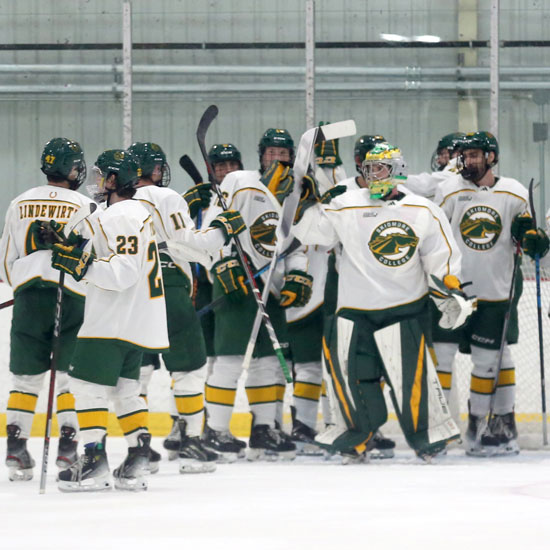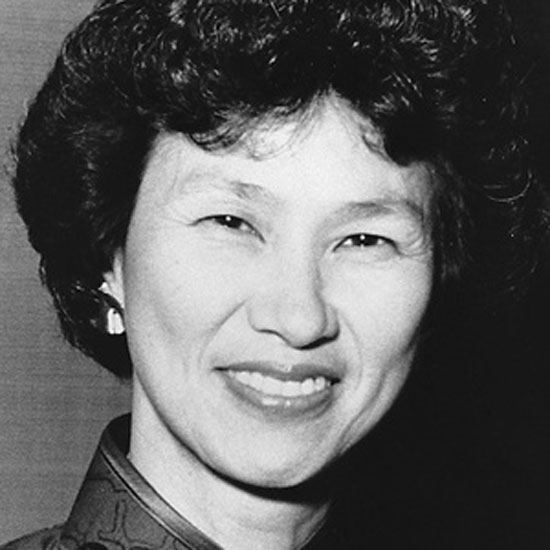With compassion, Skidmore responds to COVID-19
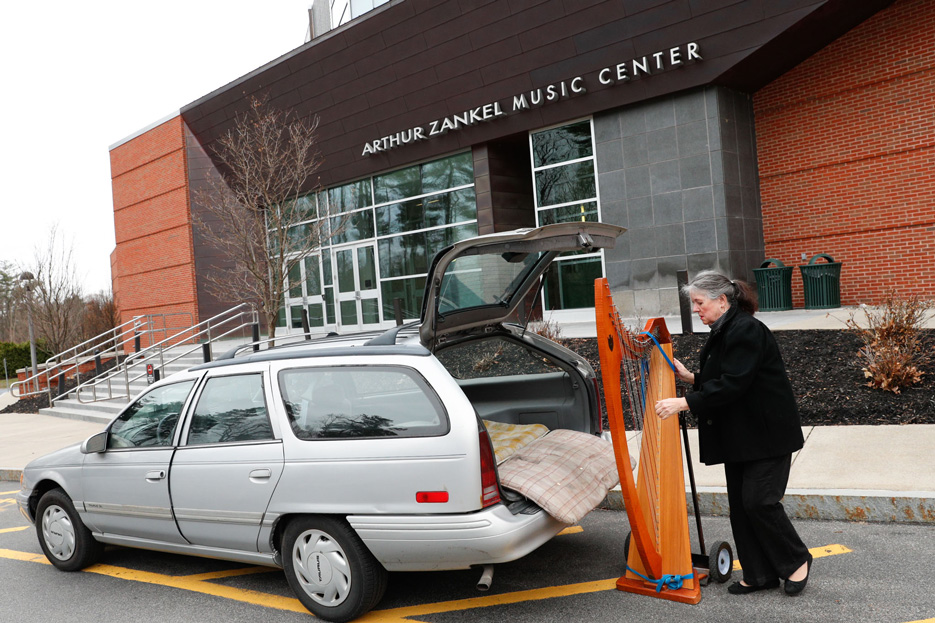
Revamping hundreds of laptops at a moment’s notice. Helping faculty to redesign courses for online learning. Raising funds for those in need. Listening and offering encouragement amid an unprecedented global health emergency. Helping students to make their way home.
These are just a few of the countless ways in which members of the Skidmore community have come together — with determination and speed — to mobilize the massive campus response to COVID-19. The challenge has been daunting, the logistics complex and the emotional toll great. But Skidmore’s leadership, staff, faculty, students and alumni community have poured labor and love into ensuring the safety of the campus and Saratoga Springs communities and doing the College’s part to slow the spread of the virus.
“The pandemic brings plenty of uncertainties for everyone. I have spent many restless moments thinking about the effect this is having on every member of our community and marveling at the incredible efforts I have seen in all corners of our campus,” said President Philip A. Glotzbach.
Our community has time and again come together to tackle and overcome enormous challenges. In our current situation, I have seen this spirit emerge more strongly than ever.”President Philip A. Glotzbach
Like many colleges, universities and other educational institutions, Skidmore has transitioned in days from in-person to online learning. The College’s Information Technology team has taken center stage, working long days and nights and readying the campus community for a monumental shift to remote instruction.
“We are in the process of collecting hundreds of laptops from all over the campus, updating them and preparing them for distribution to faculty, staff and students who may not have reliable computers that they can use at home,” said Chief Technology Officer Dwane Sterling. “We are optimistic about being able to make the transition with the least amount of disruption possible for such a dramatic change to the way Skidmore operates.”
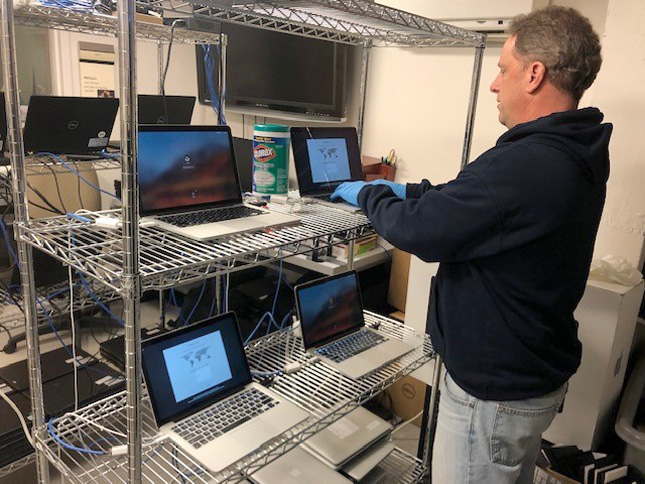
Chris Breslin, an end user computer specialist in IT, prepares laptops for distribution to faculty, staff and students for use at home.
IT staff have worked to increase the College’s storage capacity and network bandwidth to allow 122 classes to operate simultaneously. IT’s Learning Experience Design and Digital Scholarship Support team has supported that transition with webinars, learning opportunities and one-on-one support.
While Scribner Library has always been key to the delivery of courses, College Librarian Marta Brunner said the online resources the library already provides, from databases to journals to online research help, will now play an essential role.
As her team does scanning and copying and pulls together a variety of other materials to assist students and professors, the library has been collaborating with Skidmore Print Services, IT and Student Academic Services on many projects.
“It’s been great to have everyone coming together and forming partnerships,” Brunner said.
She has also been amazed at how staff have smoothly transitioned to continuing many operations remotely. “We’re used to doing everything in person and it’s really impressive how we’ve been able to adapt and meet virtually and really get things done,” she said.
In recent days, Brunner helped pull documents from Special Collections for History Professor Jordana Dym’s Archival Storytelling course — a class that requires students to handle archival records.
Sue Matrazzo, academic administrative assistant for the History and American Studies departments, and members of the Facilities staff then helped move the materials from the library to a secure classroom where Dym can continue to access the documents in a world of “social distancing.”
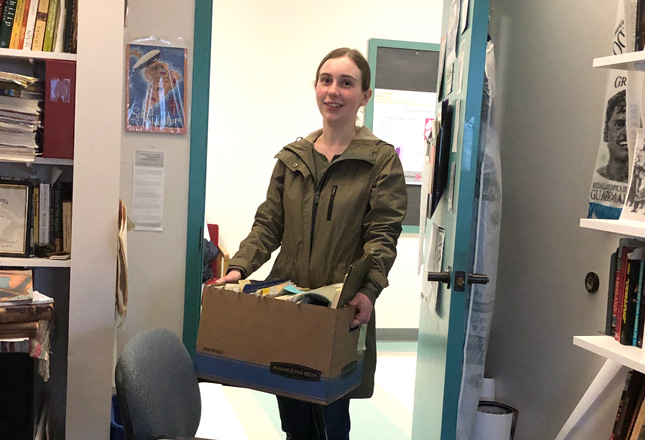
Isabel Long '21 picks up Special Collections documents she will need as she finishes taking Jordana Dym's Archival Storytelling class from home.
“We had to get materials out of Special Collections on a dime,” said Dym. Thanks to the quick work of all involved, some students were able to check out materials so they can proceed with the next step of the course. Dym will continue to work to distribute the rest.
“It takes a community to do this,” she said.
Matrazzo is among many administrative assistants who are continuing to support faculty and students as the rapid transition to online learning is made. She has been preparing materials, making sure midterm exams get out and managing communications with students as they navigate this new digital learning landscape.
“I want them to know someone is here to talk,” Matrazzo said.
Skidmore’s Residential Life team has worked around the clock to help students move out on a tight schedule that was designed to keep the community safe and reduce the risk of spreading the virus. With the assistance of colleagues from Student Affairs and Advancement, they have been greeting students and families while coordinating students’ rapid departure, helping some 200 students who remain on campus and offering support.
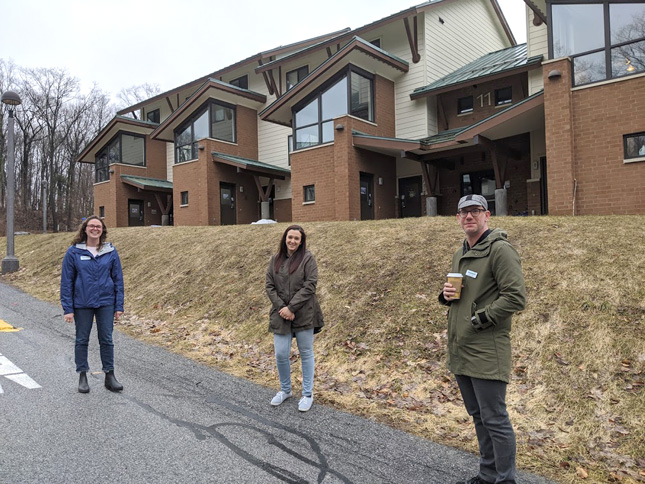
From left, Natasha Bruce, assistant director of Residential Life for housing and operations; Katie Wright, associate director of Residential Life for student conduct; and Robin Adams, director of Leadership Activities, assist with student move-out.
“These are trying times, and we’re trying to do everything we can for students under these difficult circumstances,” said Ann Marie Przywara, associate dean of student affairs for Residential Life and student conduct.
At the same time, Cori Filson and staff in the Office of Off-Campus Study and Exchanges have worked to bring students studying abroad home safely. They have not only had to monitor and comply with rapidly shifting U.S. travel guidelines, but those of dozens of countries. Their work has involved multiple program providers, airlines, governments and time zones. Equally challenging has been the tough emotional toll on students.
“We know this is disappointing and not how students envisioned their study-abroad experiences to unfold,” Filson said. “We are here to help our students and families as they navigate this new reality.”
Meanwhile, Campus Safety has been fielding a dramatic increase in service calls and working with students, parents and contracted outside vendors to remove property, including cars, from campus.
“The largest change is the sheer volume of calls coming into the Campus Safety desk,” said Tim Munro, director of Campus Safety. The department has also been re-evaluating response and office visitation protocols to allow for appropriate social distancing while still caring for the community.
“We are continually working with our public partners in Saratoga Springs Police, Fire, EMS and Saratoga Hospital,” he added.
Dining Services continues to ensure everyone on campus has something to eat while also responding to shifting guidelines and government requirements that change day to day.
“Our team has been amazing. They have been greeting students and parents and have kept a positive attitude during these difficult times,” said Director of Dining Services Mark Miller, adding that they have been donating extra food to Shelters of Saratoga and other local food banks. His team has also been accepting groceries and canned goods from departing students for those staying on campus.
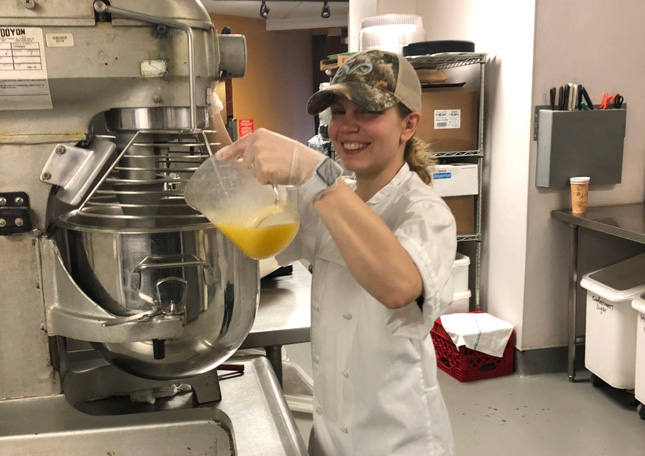
Baker Stephanie Swett makes oatmeal raisin cookies. The Dining Services team continues to prepare grab-and-go food options for anyone staying on campus.
Dining Services “has exemplified creative thinking in finding ways to serve our community,” added Kelley Patton-Ostrander, assistant vice president for financial planning and auxiliary services.
That spirit of generosity, selflessness and giving has also been demonstrated by the extended Skidmore community.
Parents, faculty, staff and students have all offered support by providing storage, giving rides near and far and offering financial support to those in need. The Student Government Association has been central to those efforts; many alumni have also mobilized behind a Student Emergency Fund with support from the Office of Advancement.
"The student working group in collaboration with students, staff, faculty and alumni, has established a COVID-19 Emergency Fund to support students,” said David Robakidze ’20, SGA President. “In just about three days, the fund has received more than $18,000 in donations, which will support students who may need assistance with housing, transportation, food and other needs as they deal with some difficult circumstances related to this health crisis. We’re incredibly grateful to everyone who has shown their support.”
(Gifts can be made online. Questions or other correspondence should be sent by email.)
“At its core, that’s what Skidmore is — a community of students, faculty, staff, alumni and parents,” said Sibyl Waterman Haley ’71, president of the Alumni Association Board of Directors and a trustee.
Many parents, too, have shown support. Bruce and Heather Lane P’23 P’11, for instance, asked that the family’s room and board refund be given back to the College for those in need.
In February, the Chinese Culture Club and Asian Cultural Awareness teamed up with organizations from Union College to raise more than $9,400 to help those affected by the outbreak in Wuhan, China.
Now, members of the Skidmore community are helping one another.
“It’s been all hands on deck, working in a way that none of us ever expected,” said Michelle Hubbs, director of the Office of Community Service Programs, who has been greeting families and helping them navigate campus during student move-out.
The whole point is to serve our students and to make these unusual times as easy as possible.”Michelle Hubbsdirector of the Office of Community Service Programs
As many continue to try to make sense of this outbreak, members of the Skidmore community are looking forward to the resumption of classes online on March 23, following the College’s extended spring break.
And Skidmore faculty are going out of their way to help students learn. Elizabeth M. Huntley, who gives private harp lessons, even arranged for three students to take 5-foot-tall harps home so they could continue to practice. Two came from her own personal collection.
Huntley pointed out that none of her students is a music student and she was inspired by their motivation to learn something new.
“This is what Skidmore does for its students,” she said. “They deserve a little music in their lives right now. It’s the least that I can do.”
Editor's note: This article was prepared before Gov. Andrew Cuomo issued an executive order requiring all "non-essential" workers throughout New York to stay home, beginning at 8 p.m. Sunday, March 22, and extending through April 17.

